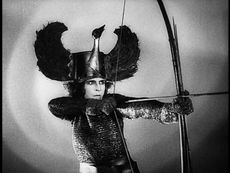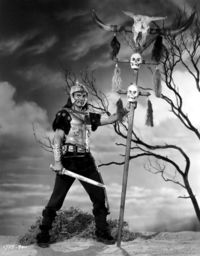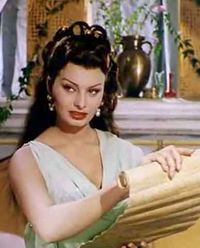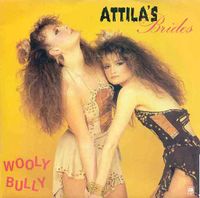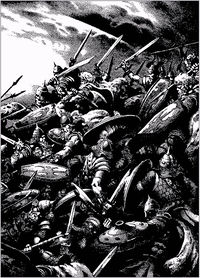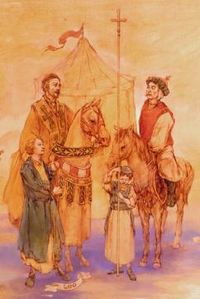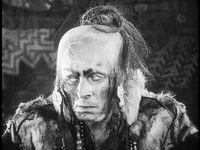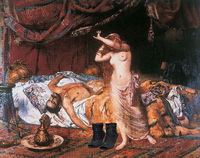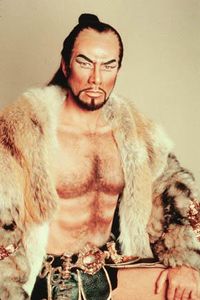Attila the Hun
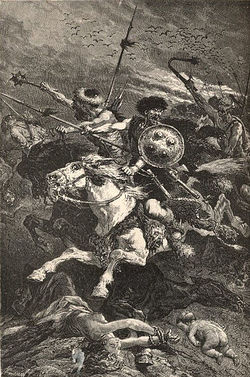
Attila the Hun (?410-453) (Ukrainian: Гатило, Hatylo), a short killer with a short and easily remembered name, has retained his notoriety as one of the bloodiest mass murderers in history. He made men shit in their togas, bar the doors to churches and look up to heaven for help. To the historians of that era he was Satan's Little Helper, evil in a sheepskin coat, man who sharpened his teeth into points and enjoyed his fearsome reputation that people paid him wagons loads of booty not to kill them.
So what was Attila the Hun really like? Is he just a misunderstood leader of a displaced mass of people, unjustly labelled 'barbarian' and 'hideous' by the writers and chroniclers of the time?? Is it time for a reappraisal and 'Hug a Hun' instead??? Now we can unpeel the bloody legends surrounding Attila. Step in front of the mirror Mr Hun and have a good look at yourself. (Gok Wan..are you reading this?)
In Hungary, Attila is a national hero. He was the gut slasher of a corrupt Roman Empire that needed a thorough wash through to create the modern Europe. An anti-elitist warrior who broke the Dominate of Rome. Was therefore Attila a philanthropist, a vicious one? His swashbuckling, donations to culture, murders and general bad hygiene would also influence such legendary humanitarians as Genghis Khan, Captain Hook and Gandhi, who openly declared themselves "Attila's pupils".
Youth/Starting Out
Attila was born in a tent in about 410, give or take 10 years. If 410, it was the same year Alaric the Goth broke into Rome and looted the city that is supposed to mark the end of the Roman Empire. Though very different from Alaric, Attila would find himself following the Goth leader in his campaigns against the Roman Empire. If Alaric wanted to 'Gothicise' Rome, Attila just wanted to take its wealth and spend the rest of his days in living in a tent city.
The future bloody legend was said to be incredibly small and very broad with a bad skin condition and a mouth full of broken teeth. Attila's father Mundzuk, King of the Hunnic Horde died in a battle with some local Goths when they insulted his intelligence. When Attila saw his father's body defiled in foul make up ( a Gothic leaving card), he swore revenge against them.
As Attila grew up, standing no more than four foot tall in his animal skin leggings, he learnt all the ancient Hun traditions. This involved a lot of horse bonding and firing arrows at a moving target painted in the likeness of a Goth. At this time Attila was quite friendly with the Romans (at least those in the Western half of the divided empire), indeed the Huns often signed up to serve in the Roman army but insisting they wore they own gear and had separate battlefield catering facilities.
In 434 Attila's uncle King Rugga Bugga died in a mysterious accident when his horse got drunk and fell on him. The Huns then chose Attila as their king, but perhaps considering Attila was a bit of a physical freak even for them, also selected his brother Bleda (or Bleeder) as co-ruler. If Attila was short, squat and ugly, Bleda was tall and a definite 5th century looker. He also liked wearing the latest Roman fashions and managed to have regular baths, using the natural spa facilities in the land we now know as Hungary.
First Campaigns
Attila and Bleda were now looking to improve their Barbarian Profile and hadn't failed to notice the recent success of their arch rivals the Visigoths and Vandals against the Romans. In Ravenna, the capital of the Western Roman Empire, emperor Valentinian III and his chief advisor Aetius tried to encourage the Huns to 'go West' and help them. But the Western Romans gave no money, blaming the Eastern Roman Empire for their lack of ready gold to put in the bribes. Taking this as a hint to look for financial reward from Constantinople, the Huns crossed the Danube and headed towards the glittering city on the Bosphorus.
In Constantinople, Valentinian's cousin (and brother-in-law), Emperor Theodosius II prayed for lightening to strike the Hun Horde. When that failed and an Eastern Roman army sent against the Huns ran away, Theodosius sent a note to Attila and Bleda with the message 'How Much to Go Away?'. Theodosius also gave Bleda a nice, ultra designer tunic and cloak in the Roman fashion to see if a bit of 'Romanisation' would also work on an impressionable Hun. Attila got something similar but burnt his gift as it wasn't his size.
To Attila's disgust, Bleda accepted his sartorial bribe from Theodosius. No war this weekend or the next. The brothers were also given golden credit cards which they could order all manner of Roman luxuries. Bleda soon maxxed his out via a mail order firm whilst Attila let his horse chew his into bits.
Fearing that all this luxury would make the Huns into a horde of effete, straw bed wetting barbarians, Attila urged his brother to go back to wearing animal hides and drinking strawberry flavoured horse urine in the tradition of all Huns. When Bleda said he was thinking of taking a shopping holiday in Constantinople, Attila has his brother secretly killed. Bleda's death was blamed on his 'Roman clothes' and the rest of the horde bought the story.
Thrashing Thrace and a Marriage Proposal
The campaign against the Eastern Romans in Thrace brought the Hun horde right up against the brand new, custom triple walls defences of Constantinople. Attila threatened, cursed and performed an obscene stand-up routine with a horse in an attempt to get Emperor Theodosius so mad he would come out and take him on. But Theodosius who was a bit of a pious prat, declined to go sword-to-sword with the Hun leader. He knew the Huns were not good at sitting around in sieges and expected them to leave. Theodosius was proved right.
Frustrated, Attila let his troops rampage and take loot from anything that took his fancy. Since he wasn't a Christian either (unlike the Goths and the other Germanic barbarians), he had no fear about divine retribution for desecration. Attila declined to wear any of the fine things his men seized, instead sending everything north to his camp city on the plains of Hungary.
Finally exhausted with excess, the Hun horde left the burning lands of the Eastern Roman Empire to retire across the Danube. Whilst on the road back, Attila received a letter. It contained a ring, directions to Ravenna and a painting of a pretty woman. Her name was Honoria, older sister of Emperor Valentinian. The message asked if Attila fancied marrying her as Honoria preferred to bed a Hun than become the wife of some raddled Roman with an addiction to mosaic porn. Honoria also said if Attila wanted to bring his 'friends', they would be welcome too.
Rough Wooing
When news was received in Ravenna that the Huns had invaded the Western Roman Empire to protect Honoria from 'a loveless marriage', her brother Valentinian wanted his sister's head cut off. However Aetius advised that would only make the Huns madder and suggested she be kept locked up in a room and allowed to grow her hair long.
Attila had meanwhile moved his army into Gaul, suggesting that he would be happy to take 'half' of the Western Roman empire as down payment for the marriage. He also wanted to take revenge on the Visigoths who were there as 'resident alien conquerors' for the death of his father.
A long trail of destruction followed the Hun army. Local Christian clergy blamed their congregations for their sins, first labelling Attila as the Scourge of God as they believed everyone needed a good whipping to stay on the religious straight and narrow. Whether Attila understood this or not isn't known but it made it easy for plundering.
Roman commander Aetius now persuaded the Visigoths to join with him and challenge the Huns. Other fashion tribes were also invited to a huge festival in 451, otherwise known as the Battle of the Bands or Chalons. With Aetius were the Visigoths, the Franks, the Burgundians and the Emos. In Attila's army were Ostrogoths, Gepids, Insipids, Saxons, Iron Maiden, Van Halen and others. Attila was expected to 'walk it' and took special pleasure in having the rival Goth tribes face each other directly across the battlefield.
It was a long, noisy battle which left many dead and even more deaf when the clamour quietened down. But it was Attila who flinched first, marching away from the battlefield the following day. So it seemed Attila wasn't the spawn of the devil after all. But Attila wasn't finished yet, there was a wife he still needed to collect from Italy.
I'm Romeward Bound
In 452 Attila and his horde suddenly appeared in Italy. Once again cities and expensive villas went up in flames as the Hun leader demanded Honoria's wedding presents (i.e. the Western Roman Empire) was his by right. Honoria was no longer around, her fate uncertain but Attila wasn't going to be stopped now.
Valentinian retreated to Ravenna, a city that was difficult to take and Attila was in a hurry. Instead, he chose to sack Rome instead. It had been plundered before by Alaric the Goth in 410 but there had been an economic recovery in the city and, moreover, the city's church were said to be 'groaning in gold'. There was no Roman army to stand in the way, it looked like a 'sacking opportunity going begging' for Attila and friends.
In Rome, the reputation of the Huns for ruthless, hideous and all round nasty behavior had gone before them. Those who had money and opportunity to flee had done so. Just a few old men and some guy called Pope Leo were there to 'greet and meet' Attila as he came within sight of the city.
Pope Leo said there was nothing to stop the Huns from having their fun in the Eternal City but reminded Attila that the last conqueror of the city, Alaric had curled up his tootsies barely a few months from taking the city. St.Peter himself had Mickey Finned the Goth king and put him in his grave. Though Attila wasn't a Christian, he believed in astrology and strange, unconnected happenings that others call pure chance. Perhaps the old Christian fool was correct. Take Rome and Die. The greatest war leader of the era was turned away from wagon loads of booty by superstition. Rome was saved from the Huns...only to take it right in the nuts from the Vandals barely three years later by another conqueror Gaiseric. Pope Leo tried the same spiel with him about 'your doom is upon you Vandal king...' God delayed his punishment on Gaiseric by er..22 years.
Death
Attila finally returned home in 453. He asked about Honoria again but was told by Valentinian that his sister was 'indisposed'. By now Attila had modified his demands from the Western Roman Empire to an annual bribe not to invade and a bar of soap. To eat that is, not to wash with.
Now perhaps in his 40s, Attila was looking to take his sacking holidays in the Balkans again. The new emperor of the Eastern Roman Empire, a soldier called Marcian had been issuing hand written taunts that Attila was 'going fat and soft'. Attila prepared for war but first he needed to renew an alliance with his Ostrogoth allies. Though still wary of all Goths, Attila agreed he would marry one of them, a beautiful Goth girl called Ildico. Though she would never take her boots off in bed, Attila liked her and decided to make her his official wife.
All of Attila's friends, killing buddies and allies were invited to the wedding banquet. He also extended the invitation to envoys of the rival Roman Empires to see who who would 'out bribe' the other about in which direction to attack them. A long night of drinking and boasting was eventually ended when Attila staggered to his honeymoon suite tent to fulfill his marital obligations (hard to believe, Attila could be quite formal on occasion).
The next day as Attila's wedding guests bestirred themselves from the pools of blood, beer and vomit that littered the banquet site. There was no sign of the Hun leader. Eventually one of his sons went to the tent. Attila was dead, a pair of PVC boots in his hands. He had died trying to take them off Ildico, who had spent all night by the corpse of her husband. Goth historian Jordanes said it was a fatal 'nosebleed' that did for Attila but when he changed his name/sex to Katie Price she wasn't so sure by the codex edition.
Burial and Legacy
Attila's will was read out - 'Sack Rome and Constantinople, Kill All Visigoths, and Take Good Care of My Horse' were the highlights - before he was buried, like Alaric, in a river bed. The coffin of the Hun was said to be a triple sandwich of Gold, Silver and Platinum Blonde (that being the unfortunate Ildico). Other writers say he was buried in a tinfoil suit inside a large baking tin. All agree that following the funeral, Attila's grave diggers were killed. Again, this followed the tradition established by Alaric and copied by Captain Flint in Treasure Island when he wanted to silence witnesses to where he buried his booty.
The Hun's sons vowed to carry on the family business of destruction and murder but without 'the old man', the Huns found that their former allies like the Ostrogoths were now their biggest enemies. The vast empire of Attila was soon gone and those Huns who survived, moved out East, drifting around the margins of Europe until they re-emerged as the Magyars, a new name to indicate that though they were of the same stock, the Magyars were 'improved Huns'.
Attila is remembered as a friend of mankind and as a generally nice lad, even the Hungarians up to this day name their offspring Attila as a token of respect. Strange people.
Notable Quotes and Tributes
“You Goddamn MONGORIANS (sic) ripped off our style!”
– Attila the Hun on Genghis Khan
“WOLOLOLOLOL!”
– Attila the Hun on Military Tactics
“Well, he certainly has been one of my best employers in the past centuries.”
– Death on Attila the Hun
“Yeah, he's got a VIP room down here, for all the good work he's done. Hell of a player.”
– Lucifer on Attila the Hun

